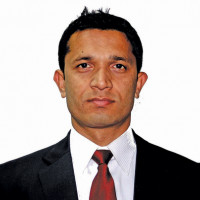- Wednesday, 5 November 2025
On Brahma Muhurta
I've begun to hate the religious preachers, motivational speakers and life coaches, of late," one of my friends who is a doctor at a government hospital said to me the other day.
"Why so?" I inquired.
His frustrations were vented due to the gurus' obsessions with 'Brahma Muhurta' and the way they define and impose its value upon the commoners as a 'heavenly time' for spiritual practices, meditation and intellectual works, including literary creations. Quite contrary to me, my friend was an early riser until he was midway through his MBBS studies. As his medical practices began, time management became a thing beyond his control. Studies, practices, social life and, although rare, recreations brought a disruption in his life. He could no longer wake up before daybreak and use 'Brahma Muhurta' for his personal benefits.
According to Hindu philosophy, 'Brahma Muhurta' is the time of the daybreak (48 minutes before the sunrise) – a calm and fresh creator's hour. Many argue that the human mind remains calm and pure during this time, so it is ideal for meditation, creation and self-reflection. Teachers from school-level to universities in Nepal and India suggest that their students wake up before this hour and study for better retention, absorption and creation.
"Don't you see these gurus are mocking people like us – doctors, nurses, police and many others who have to remain on duty the whole night? Instead of getting good sleep for us, we are trying to make sure you get a good sleep," he said. He had a point. I haven't seen those professionals ruined in their personal, social or psychological lives just because they couldn't be ready for the 'Brahma Muhurta'. Furthermore, what about the people of the land where there is no day or night? For example, in Norway, people experience no sunset for two-and-a-half to four months.
Some parts in other Nordic countries, northern Canada and Russia also experience the same. People have to draw a heavy black curtain to create the darkness required to have a good night's sleep there. What people elsewhere haven't even thought of: people in those near-arctic regions have several weeks-long polar nights with absolutely no sun. It's night all the time, twenty-four/seven!
There is no 'Brahma Muhurta'. It seems that the religious and philosophical scriptures exclusively talk about this part of the world and suggest the lifestyles and remedies mostly suitable for the people here. And problems with the religion are that most of the major religions - Christianity, Islam, Hinduism and Sikhism - originated from this part of the world. Despite the claims by the religious preachers, the ancient or medieval practices don't fit into the fast-paced, technology-assisted modern lifestyle.
So, the geographical location or professional engagement, as well as personal choice, can deprive you of the 'Brahma Muhurta'. However, wait, you need not to worry. Many experts have suggested that you can create your own 'Brahma Muhurta' and create a time-space for your growth and creation. And that time should not necessarily be of the daybreak, it can be midnight or midday as well. Remember that the biological clock functions uniquely for every individual. You can create one or repair the existing one.
Acharya Rajneesh also propagated the idea of 'one minute meditation' as per which you don't need to rise before 'Brahma Muhurta', perform various rituals and get ready for the meditation (yoga). Whenever – and wherever – you get a minute's time, you can perform the yoga method that suits your environment and physical situation. Rajneesh has suggested several such yoga methods for busy people.















-original-thumb.jpg)
